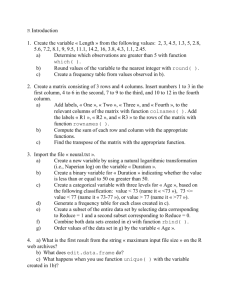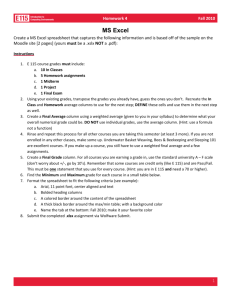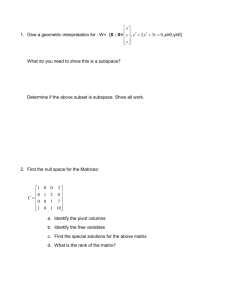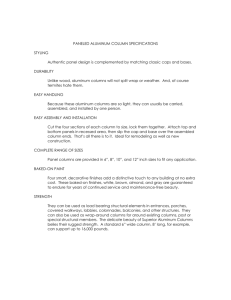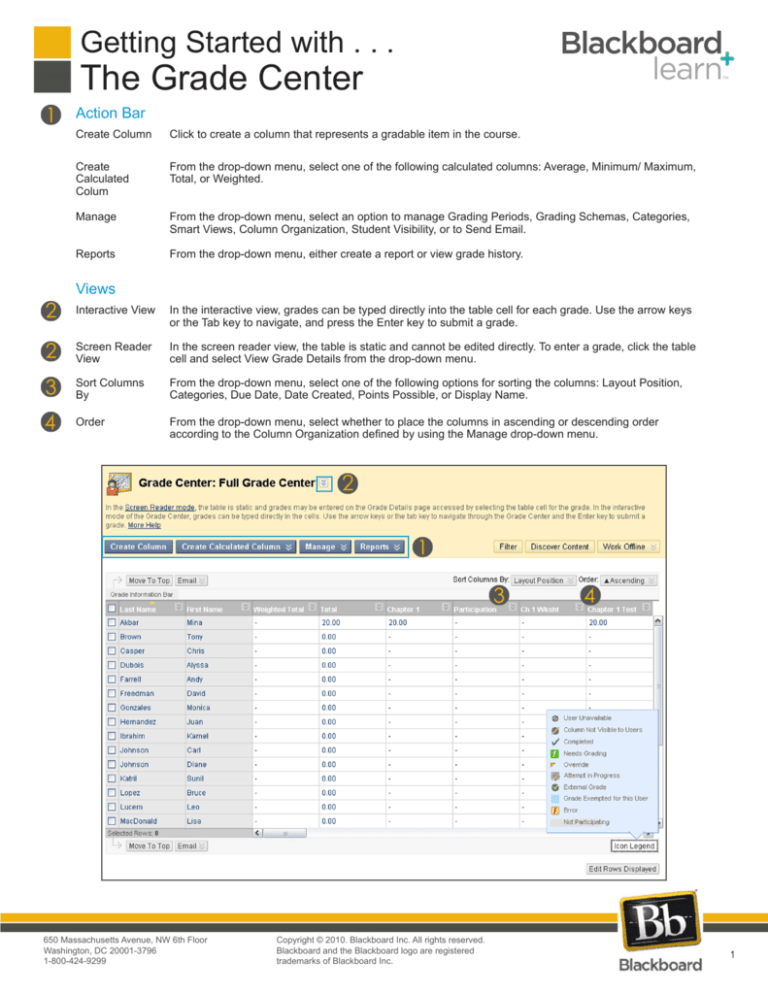
Getting Started with . . .
The Grade Center
Action Bar
Create Column
Click to create a column that represents a gradable item in the course.
Create
Calculated
Colum
From the drop-down menu, select one of the following calculated columns: Average, Minimum/ Maximum,
Total, or Weighted.
Manage
From the drop-down menu, select an option to manage Grading Periods, Grading Schemas, Categories,
Smart Views, Column Organization, Student Visibility, or to Send Email.
Reports
From the drop-down menu, either create a report or view grade history.
Views
Interactive View
In the interactive view, grades can be typed directly into the table cell for each grade. Use the arrow keys
or the Tab key to navigate, and press the Enter key to submit a grade.
Screen Reader
View
In the screen reader view, the table is static and cannot be edited directly. To enter a grade, click the table
cell and select View Grade Details from the drop-down menu.
Sort Columns
By
From the drop-down menu, select one of the following options for sorting the columns: Layout Position,
Categories, Due Date, Date Created, Points Possible, or Display Name.
Order
From the drop-down menu, select whether to place the columns in ascending or descending order
according to the Column Organization defined by using the Manage drop-down menu.
650 Massachusetts Avenue, NW 6th Floor
Washington, DC 20001-3796
1-800-424-9299
Copyright © 2010. Blackboard Inc. All rights reserved.
Blackboard and the Blackboard logo are registered
blackboard
com
trademarks ofwww
Blackboard
Inc.
.
.
1
Getting Started with . . .
The Grade Center
Task
What You Need to Know
Steps to Accomplish
Enter or Change a
Grade
Manual Grades: Grades can be entered or changed
(overridden) manually from the Grade Center or the
Grade Details page.
Automatic Grades: Some grades are added
automatically to the Grade Center from work
generated in other areas of Blackboard Learn. Each
gradable item that is created in another area of the
course automatically generates a Grade Center
column. These automatic grades can be changed
(overridden) manually in the Grade Center. All
changes are recorded in the Grade History.
To enter or change a grade from the Grade
Center:
1. Point to and click the desired cell.
2. Type the value.
3. Press Enter.
Delete a Grade
Grades can be deleted from the Grade Center.
Deleting a grade also deletes the Override Grade and
any associated comments.
1. Point to and click the grade to be deleted.
2. Press Delete or Backspace.
3. Press Enter.
4. On the popup message, click OK.
Grades that are set to NULL display a dash (-).
Note: Grades can also be set to null by typing the
NULL character in the cell.
Exempt a Grade
Students can be exempted from a grade from the
Grade Center or the Grade Details page. Exempted
grades are not added into any statistical or total grade
calculations. Exempted grade display an Exempted
icon in the cell. Comments can be added to any
exempted grade.
To exempt a grade, point to the desired cell, click
the Action Link, and select Exempt Grade.
To add a comment, point to the desired cell, click
the Action Link, and select Quick Comment.
To clear the exemption and go back to the
previous score, select Clear Exemption.
Edit or Erase an
Attempt
Grades for specific attempts can be edited or erased.
The other attempts are unaffected, and the most
recent attempt becomes the Current Grade. This is
useful if, for example, a Student began a test but
was interrupted and unable to complete it. Clearing
the attempt allows the Student to take the test again
without having the interruption count.
To edit an attempt:
1. Point to the desired cell, click the Action Link,
and select View Grade Details.
2. Under Edit, select Edit Grade.
3. Type the new score in the Value box and add
any Feedback to User or Grading Notes.
4. Click Save.
To erase an attempt:
1. Point to the desired cell, click the Action Link,
and select View Grade Details.
2. On the Edit tab, select Clear Grade.
3. On the popup message, click OK.
Undo a Grade Change After a grade has been changed (overridden), it can
be reverted to the original value.
650 Massachusetts Avenue, NW 6th Floor
Washington, DC 20001-3796
1-800-424-9299
To change a grade from the Grade Details page:
1. Point to the desired cell, click the Action Link,
and select View Grade Details.
2. On the Edit tab, type the new score In the
Currrent Grade box and add any Feedback
to User or Grading Notes.
3. Click Save.
1. Point to the desired cell, click the Action Link,
and select View Grade Details.
2. Next to the Current Grade information, click
Revert.
3. Click OK when the warning message
appears.
Copyright © 2010. Blackboard Inc. All rights reserved.
Blackboard and the Blackboard logo are registered
trademarks of Blackboard Inc.
2
Getting Started with . . .
The Grade Center
Create a Grade
Column
Grade Columns represent gradable items such as
1. In the Action Bar, click Create Column.
tests and papers. You can manually create Columns in 2. Provide a Column Name.
the Grade Center or automatically generate them from
3. Provide a Grade Center Display Name. This
outside of the Grade Center.
appears as the column header in the Grade
Center.
4. Provide a Description to help Instructors and
other graders identify the column.
5. Select the other settings as appropriate.
6. Click Submit.
Create a Weighted
Column
A Weighted Grade is a Calculated Column that
1. In the Action Bar, point to Create Calculated
displays the calculated result of quantities and their
Column and select Weighted Column.
respective percentages. A Weighted Grade can be
2. Type a Column Name.
displayed as a column in the Grade Center. Instructors
3. Type a Grade Center Display Name. This
control the visibility of the column in the Grade Center
appears as the column header in the Grade
as well as the release of the column to students and
Center.
other users.
4. Type a Description to help Instructors and
other graders identify the column.
5. Select the Columns and Categories to
include.
6. Set the percentage of the total for each
Column or Category.
7. Select the other settings as appropriate.
8. Click Submit.
Delete a Column
Manual Columns: Columns that are created manually
can be deleted directly from the Grade Center.
Automatic Columns: Columns that are generated
automatically when a test, survey, assignment, group
assignment, or graded forum or thread is added
to the course cannot be deleted directly from the
Grade Center. The item itself must be deleted from
the Content Area. The column then will be removed
automatically from the Grade Center.
To delete a manually created column, click the
drop-down list in the column header and select
Delete Column.
Deleting a Column is a final action and cannot be
undone.
Group Grade Columns Categories can be created to organize the Grade
into Categories
Center and run reports on specific types of grades.
Default categories include Assignment, Discussion,
Survey, and Test. Create Categories before creating
Grade Center Items.
To create a Category:
1. In the Action Bar, point to Manage and select
Categories.
2. Click Create Category.
3. Provide a Name for the Category.
4. Provide a Description for the Category. This
field can help differentiate Categories and
explain the purpose of the Category.
5. Click Submit.
Changing Column
Categories
1. In the Grade Center, on the action bar, point
to Manage to access the drop-down list.
2. Select Column Organization.
3. On the Column Organization page, select the
check box for the column to move.
4. On the action bar, point to Change Category
to… to access the drop-down list.
5. Select the category to which to move the
column.
6. Click Submit to save changes.
You can move columns from one category to another.
You can also move a column from a category to no
category.
You can move any column, except calculated columns,
to a different category. For example, you can move a
column from the Discussions category to a category
named Extra Credit.
650 Massachusetts Avenue, NW 6th Floor
Washington, DC 20001-3796
1-800-424-9299
Copyright © 2010. Blackboard Inc. All rights reserved.
Blackboard and the Blackboard logo are registered
blackboard
com
trademarks ofwww
Blackboard
Inc.
.
.
3
Getting Started with . . .
The Grade Center
Hiding Rows and
Columns
You can hide columns and rows to focus on specific
data. When you hide information, the data is retained.
Hiding a Row
1. Open the contextual menu next to a user’s
name.
2. Select Hide User.
Hiding a Column
1. Open the contextual menu for the column
you want to hide.
2. Select Hide Column.
Showing Rows
This feature is used to display a hidden row, or to
show or hide multiple users simultaneously.
1. On the action bar, point to Manage.
2. Select Student Visibility.
3. On the User Visibility page, select the check
boxes for the users to be shown or hidden.
4. On the action bar, click Hide Users or Show
Users.
5. Click Submit.
Sorting Rows and
Columns
You can sort the information in rows and columns. The
sorting remains in effect only as long as your current
session. Once you close your browser, the view
returns to the default.
You can sort rows by ordering grades from
highest to lowest or lowest to highest. You can
also sort rows by first or last name. To sort rows,
click the column title or the caret in the column.
To sort columns, on the action bar, click Sort
Columns by to access the drop-down list and
select the sorting order.
Column Organization
The Column Organization page provides an at-aglance view of the columns in the Grade Center. Each
column is represented by a row, with the top row
representing the left-most column in the Grade Center.
650 Massachusetts Avenue, NW 6th Floor
Washington, DC 20001-3796
1-800-424-9299
Access the Column Organization page by
pointing to Manage on the Action Bar to access
the drop-down list.
1. Select the check boxes, click Show/Hide on
the Action Bar, and select your option from
the drop-down list. Multiple columns can be
shown or hidden. Hiding columns reduces
the length of the grid and reduces the need
for continuous scrolling. Existing information
is retained.
2. Use the move icon to drag the item to the
new location.
3. Columns in gray are frozen in place on the
left side of the Grade Center, so they do not
move while scrolling through other columns.
4. Drag the bar to change which columns are
frozen. Click Submit to save changes.
Copyright © 2010. Blackboard Inc. All rights reserved.
Blackboard and the Blackboard logo are registered
blackboard
com
trademarks ofwww
Blackboard
Inc.
.
.
4
Getting Started with . . .
The Grade Center
Add Rubrics to Grade
Center Columns
Associate a rubric to a Grade Center column for
quick reference when viewing or grading a student’s
submission. Using rubrics makes grading easier and
more objective because the criteria for achievement
are available during grading and can be applied for all
students as you add grades.
For convenient reference you can view a rubric
while grading student submissions. From the Grade
Details page, click View Rubric. The rubric will open
in a new window so that you can view it and student
submissions.
1. On the Control Panel, under Grade Center,
select Full Grade Center.
2. In the Grade Center, click the action link
beside a column heading to access the
contextual menu.
3. Select View and Add Rubrics.
4. Click Add Rubric.
5. On the Rubrics page, preview and select one
or more rubrics you have made.
6. Click Show List beside Selected Rubrics to
view the rubric or rubrics selected.
7. Click Submit.
Customizing the Letter Grading Schemas are mappings of a student’s raw
Grade Schema
score to a grade display, such as a letter grade or a
pass/fail evaluation.
There is a default schema for letter grades that
consists of letter grades from A+ to F and their
corresponding percentage ranges. If you choose to
display students’ scores as letter grades, the default
letter schema is used to convert the scores to letter
grades. You can customize the default letter schema
to match your institution’s grading scheme.
1. In the Grade Center, on the action bar, point
to Manage to access the drop-down list.
2. Select Grading Schemas.
3. On the Grading Schemas page, click the
Letter action link to access the contextual
menu.
4. Select Edit.
5. On the Edit Grading Schema page, edit
the Name, if you want, and add an optional
Description.
6. In the Grades Scored Between text box,
type the percentage range for the letter
grade.
7. In the Will Equal text box, type the letter
grade.
8. In the Will Calculate as text box, type the
percentage value to be used if a letter grade
is added manually.
9. Repeat steps for all letter grade values you
want to edit.
10. Click Submit.
Creating Grading
Period
1. In the Grade Center, on the action bar, point
to Manage to access the drop-down list.
2. Select Grading Periods.
3. On the Grading Periods page, click Create
Grading Period on the action bar.
4. On the Create Grading Period page, type
the Grading Period Name and an optional
Description.
5. Select a date range in order to automatically
associate columns that have a due date
within that range to the Grading Period.
6. Select the check box for Associate Columns
to automatically associate all columns with a
due date within the range.
7. Click Submit.
You can create an unlimited number of Grading
Periods to organize your columns.
650 Massachusetts Avenue, NW 6th Floor
Washington, DC 20001-3796
1-800-424-9299
Copyright © 2010. Blackboard Inc. All rights reserved.
Blackboard and the Blackboard logo are registered
blackboard
com
trademarks ofwww
Blackboard
Inc.
.
.
5
Getting Started with . . .
The Grade Center
Assigning Columns to
a Grading Period
You can move columns from one Grading Period to
another. You can also move a column from a Grading
Period to no Grading Period.
Viewing and Grading
by Question
You may choose to view and grade tests by question.
1. In the Grade Center, locate the column
This allows you to jump from test to test, viewing and
header of the test you want to grade.
scoring the same question for each student. Doing this 2. Open the contextual menu and select Grade
you can save you time by concentrating on a single
Questions.
question. It also allows you to see how all students
3. On the Grade Questions page, you can filter
responded to the same question giving you an at-athe questions by status: Graded, Needs
glance picture of how they all did on that one question.
Grading, or In Progress, if there are many
questions.
4. Click the number under Responses by the
question you want to grade.
5. On the Grade Responses page, expand the
Question Information to view the question.
6. Click Edit to by each student response to
grade it.
7. Type the Score. Optionally, you can add
feedback in the text editor.
8. Click Submit.
9. Click Back to Questions when all student
responses are graded.
Viewing and Grading
Anonymously
You may choose to view and grade tests by
anonymously, hiding the name of the students.
650 Massachusetts Avenue, NW 6th Floor
Washington, DC 20001-3796
1-800-424-9299
1. In the Grade Center, on the action bar, point
to Manage to access the drop-down list.
2. Select Column Organization.
3. On the Column Organization page, select the
check box for the column to move.
4. On the action bar, point to Change Grading
Period to… to access the drop-down list.
5. Select the Grading Period to which to move
the column.
6. Click Submit to save changes.
1. In the Grade Center, locate the column
header of the test you want to grade.
2. Open the contextual menu and select Grade
Questions.
3. On the Grade Questions page, select Grade
Responses Anonymously. Student names
are hidden and responses are identified as
Stuident1, Student2, and so on.
4. Click the number under Responses by the
question you want to grade.
5. Click Edit to by each student response to
grade it.
6. Type the Score. Optionally, you can add
feedback in the Text Editor.
7. Click Submit.
8. Click Back to Questions when all student
responses are graded.
Copyright © 2010. Blackboard Inc. All rights reserved.
Blackboard and the Blackboard logo are registered
blackboard
com
trademarks ofwww
Blackboard
Inc.
.
.
6
Getting Started with . . .
The Grade Center
Creating Smart Views
As you enter and view grades, you are automatically
obtaining information on how students are performing
in the course. You can tailor your view of student
progress by creating Smart Views. A Smart View
shows only the data that matches a set of criteria.
650 Massachusetts Avenue, NW 6th Floor
Washington, DC 20001-3796
1-800-424-9299
1. In the Grade Center, on the action bar, point
to Manage to access the drop-down list.
2. Select Smart Views.
3. On the Smart Views page, click Create
Smart View.
4. On the Create Smart View page, type the
Name of the Smart View. This name appears
in the Current View drop-down list under
Smart Views. Optionally, type a Description.
5. Select the check box for Add as Favorite to
add the Smart View to the Control Panel.
6. Select the Type of View.
7. Complete the Select Criteria section:
• Under User Criteria, select the grade
column.
• Under Condition, select the criteria,
such as Less than or Equal to.
• In the Value text box, type the score or
percentage against which the criteria
and condition will be assessed.
8. Select the Filter Results from the drop-down
list by selecting the columns to appear in the
Smart View.
9. Click Submit. The list of Smart Views
appears on the Smart Views page.
Copyright © 2010. Blackboard Inc. All rights reserved.
Blackboard and the Blackboard logo are registered
blackboard
com
trademarks ofwww
Blackboard
Inc.
.
.
7
Getting Started with . . .
The Grade Center
Glossary
Calculated Columns
A calculated Column gathers data from multiple Grade Center columns and performs a calculation to attain performance results, such as an average grade for a set of assignments. In turn, data
from multiple Calculated Columns can be gathered to create a composite Calculated Column. New
Courses and Restored Courses contain two Calculated columns by default: a Total Points column
and a Weighted Grade column. The following Calculated Columns are available: Average, Minimum/
Maximum, Total, and Weighted.
Categories
A Grade Center Category is a classification for columns. For example, Homework, Test, or Quiz.
Categories may also be used to create Smart Views comprised of columns associated with specific
Categories. Categories can be used with Grade Center columns such as a Weighted Grade Column,
Total Points Column, or Average Grade Column.
Download Grade Center
Grade Center data can be downloaded as a delimited (separated) file and used in spreadsheet or
statistical analysis applications such as Microsoft Excel. Instructors can download the complete
Grade Center page or select specific data to download.
Freezing Columns
Grade Center columns can be frozen in place so that they do not move while scrolling through the
other data. The columns that contain the first and last names of students are frozen by default. This
feature can be used to easily match up individual students with their data across the length of the
Grade Center. Freeze and unfreeze any of the columns on the Column Organization page.
Grade Center Statistics
The Grade Center can show various statistical information related to columns and Students. Column
Statistics displays statistics for a Grade Item, such as average, median, and standard deviation.
Grade History
The Grade History page lists all of the changes that occurred to grades within a Course during the
selected time frame. The Grade History entries can be sorted by column and that current view can
be downloaded.
Grading Period
Grading Periods are time segments that can help manage the Grade Center. Grading Periods can be
defined as Terms, Semesters, Quarters, or Years, and can have date ranges that further define them.
Instructors can filter the Grade Center by Grading Period to display only the relevant columns in the
segment. Grading Periods can also be used to view the performance of students in a certain Grading
Period, create a Report that displays the performance for a Grading Period, and calculate a Grade
column for a Grading Period.
Grading Schema
A Grading Schema is a mapping of percentage ranges to specific grade displays. For example, a
student’s raw numeric score on a quiz that has 100 possible points is an 88. In a Grading Schema in
which a percentage of 87.5 to 89.5 equals a B+, this score results in a B+. If the grade display option
is Letter, the B+ will display to the Student.
Hide Columns
Hiding a column saves all existing information associated with the column, but prevents it from being
seen in the Grade Center. Hiding columns that are not currently being used reduces the length of the
grid and the need for scrolling.
Reports
Printable Reports, such as a progress report, can be created by clicking Reports in the Action Bar,
selecting Create Reports, and then defining the report data. Reports can display all or a number of
Students or Groups; Grade Columns or Calculated Columns; a Grading Period; or all of the columns
in a Category. Reports print the data for one Student per page. Reports can be customized in a
variety of ways, including unique report header and footer information. Reports can also include a
signature line, date, Course Information, and many other data elements.
Upload Grade Center Columns
Grades can be created off-line and then uploaded to the Grade Center. Grades that were created
in another grade system can also be uploaded for inclusion in the Grade Center. The data in the file
must be synchronized to the Grade Center data by using unique identifiers for each student (User
Name) and each Grade Center column (Column ID number). Column ID numbers are generated by
the system and should not be changed or removed.
Smart Views
Smart Views are specific views of the Grade Center based on a variety of criteria. After a Smart View
has been created and saved, it becomes an item under Grade Center in the Control Panel. Users
can toggle between the Full Grade Center view and any defined Smart Views or Grading Periods.
650 Massachusetts Avenue, NW 6th Floor
Washington, DC 20001-3796
1-800-424-9299
Copyright © 2010. Blackboard Inc. All rights reserved.
Blackboard and the Blackboard logo are registered
blackboard
com
trademarks ofwww
Blackboard
Inc.
.
.
8

